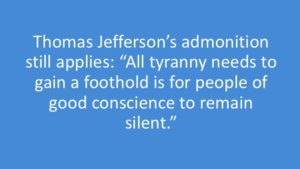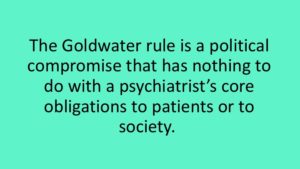by Bandy X. Lee, MD, MDiv
Earlier this year, I was delighted to discover that Dr. Alan Stone had written a review of the book I edited: The Dangerous Case of Donald Trump: 27 Psychiatrists and Mental Health Experts Assess a President, for the blog Lawfare. Most outside of psychiatry will not have heard of Dr. Stone, but he is a well-respected figure among psychiatrists who practice at the intersections of law and ethics, such as myself. I was delighted not because I was anticipating a positive review, but because I hoped that a rigorous discussion without misrepresentation would break open the myopia of my field.
I had little worry that the book would hold up under serious ethical scrutiny; what continued to concern me was institutional complicity,specifically, of the American Psychiatric Association(APA). Alas, in the end, not even the venerable Dr. Stone would stand up to the APA. His review consisted of the customary criticisms: A description of the so-called “Goldwater rule” and how it came about from a group of psychiatrists who embarrassed the APA (he does offer numbers that reveal that less than 10% of psychiatrists surveyed by Factmagazine offered egregious diagnoses); how the “duty to warn” doctrine does not apply to public figures; and how psychiatrists have nothing more to add than laypersons in the absence of a personal examination. He confirms that the APA “strengthened” the Goldwater rule in the Trump era, although he offers no critique of it. What disappointed me, in the end, was not inaccuracy but an inability to broaden beyond the usual scope of debate around professional responsibility.
 I had not been involved with the APA since my resignation over ten years ago, over what I considered to be excessive pharmaceutical industry ties. Although the APA is a voluntary association and not all psychiatrists belong to it, I had still looked to the organization as a mechanism for developing guidelines for professional ethics and ethical conduct. It was very disturbing to me, therefore, when it took such a radical step as to create a gag order out of the Goldwater rule. In its original form, it prohibited only diagnosis (a small portion of what psychiatrists do) of public figures without a personal examination and without authorization. Since the Trump administration, it prohibits any comment of any kind, under any circumstance, on a public figure.
I had not been involved with the APA since my resignation over ten years ago, over what I considered to be excessive pharmaceutical industry ties. Although the APA is a voluntary association and not all psychiatrists belong to it, I had still looked to the organization as a mechanism for developing guidelines for professional ethics and ethical conduct. It was very disturbing to me, therefore, when it took such a radical step as to create a gag order out of the Goldwater rule. In its original form, it prohibited only diagnosis (a small portion of what psychiatrists do) of public figures without a personal examination and without authorization. Since the Trump administration, it prohibits any comment of any kind, under any circumstance, on a public figure.
Dr. Stone is correct in that I am a strong proponent of the original Goldwater rule, which is why I oppose changing it, especially under political pressure. I have kept it voluntarily over twenty years of forensic practice, even though forensic cases are exempt; it is simply a standard I like to bring. However, let us be clear: before any prohibition, the rule is a mandate to act—to “contribut[e] to the improvement of the community and the betterment of public health” by educating the public when asked about a public figure but refraining from diagnosis. Rather than taking a leadership role when this mandate for public health was most critical, the APA rather turned it into a gag rule, so that in order to keep the second part (not to diagnose), one must renounce the first part (to educate in relation to public figures).
The result of this action is that we have a most extraordinary situation where the new rule effectively works to sideline the people most qualified to comment, ceding mental health debates to non-expert commentators. The outcome is not neutral: in the very context where mental health professionals may have been crucial to pointing out dangerous patterns of behavior, it has allowed malignant forms of psychological pathology to become normalized in national affairs. Meanwhile, the public is given the false impression that experts are in disagreement, when hardly any disagreement existed before the Goldwater rule modification, and there is near-consensus on the substance of Mr. Trump’s dangerousness. In effect, by silencing the most relevant discourse at a critical time, it has enabled a destructive regime to proceed with dangerous acts without being checked. The Declaration of Genevaclarified the humanitarian goals of medicine under the recognition that not only physician participation, but also physician silence, assisted the Nazi atrocities. Especially when the political branches are not serving their function for partisan reasons and the public is kept in the dark, it seems particularly important for neutral fields such as medicine and psychiatry to speak for public safety and the preservation of life.
When a foremost professional organization acts as an agent of the state, bending rules to suit the political situation, then it is especially imperative for professionals to speak, if only to preserve the reputation of the field. In this case, precisely when mental health professionals were beginning to alert the public about a mental health issue of national implications, the APA stifled that warning. It did not stop there: on October 6, 2017, three days after the publication of our book, it issued a public statement that a “duty to warn”does not apply to public figures. Even Dr. Stone makes the mistake of confounding a Tarasoff duty (to the patient) with our societal duty to warn—when the APA’s code states clearly that we have a responsibility to society in addition to our responsibility to patients. Further, on January 9, 2018, six days after I revealed to the public of having debriefed members of Congress, it issued another statement prohibiting “armchair psychiatry” and “using psychiatry for political or self-aggrandizing purposes”. Yet I was speaking about public health consequences, not about personal mental health that would require an examination, and I had responded to the request in the capacity of expert consultant (a function the APA guidelines themselves encourage). As a result, it incurred the very situation the original Goldwater rule was meant to prevent: It stigmatized mental illness by turning psychiatry into a rarefied field that one should not speak about, and turned psychiatric ethics into a political tool.
 Most disappointingly, Dr. Stone does not venture to discuss the critical question: why the APA felt the need to change its interpretation of a rule that was on its way out, under this presidency, going against scientific and practical norms,without members’ input and against their protest. In doing so, it forces the adherent to infringe not only the ethical principle the rule falls under but the preamble of both the code of the American Medical Association and the code of the APA, which stipulate our responsibility to society. A decree not only takes away an essential aspect of ethical deliberations—the agency capable of carefully weighing sometimes competing guidelines—but eliminates limits or countervailing rules that have been the hallmark of ethical rules since Ancient Greek times.
Most disappointingly, Dr. Stone does not venture to discuss the critical question: why the APA felt the need to change its interpretation of a rule that was on its way out, under this presidency, going against scientific and practical norms,without members’ input and against their protest. In doing so, it forces the adherent to infringe not only the ethical principle the rule falls under but the preamble of both the code of the American Medical Association and the code of the APA, which stipulate our responsibility to society. A decree not only takes away an essential aspect of ethical deliberations—the agency capable of carefully weighing sometimes competing guidelines—but eliminates limits or countervailing rules that have been the hallmark of ethical rules since Ancient Greek times.
Those who claim to uphold free speech, including Dr. Stone, still do not declare the prohibitive aspect of the Goldwater rule for what it is: a political compromise that has nothing to do with a psychiatrist’s core obligations to patients or to society. It is arguably not even an ethical rule—and if there were a professional restriction on speech regarding a public figure, as with a patient, then it seems there ought to be analogous instances of a positive professional duty to speak, as with a patient.
We intended the book as a public service, to make mental health expertise accessible, while removing all financial conflicts of interest from the authors, including myself. Authors sometimes risked their careers if not their personal safety to contribute, but they also inspired thousands of colleagues to come forth in support. Thus, the unlikely multi-authored book of specialized knowledge managed to stay on the New York Times bestseller list for seven weeks. As much as I have looked to Dr. Stone and other authority figures as examples in the past, in this moment of historical, moral, and public health crisis, I realize all the more that one cannot defer moral deliberations to others. Thomas Jefferson’s admonition still applies: “All tyranny needs to gain a foothold is for people of good conscience to remain silent.”
The views expressed by Bandy X. Lee, M.D., M.Div. are solely her own. This post reflects the views of the authors and not necessarily those of bioethics.net, the American Journal of Bioethics, or their staffs.